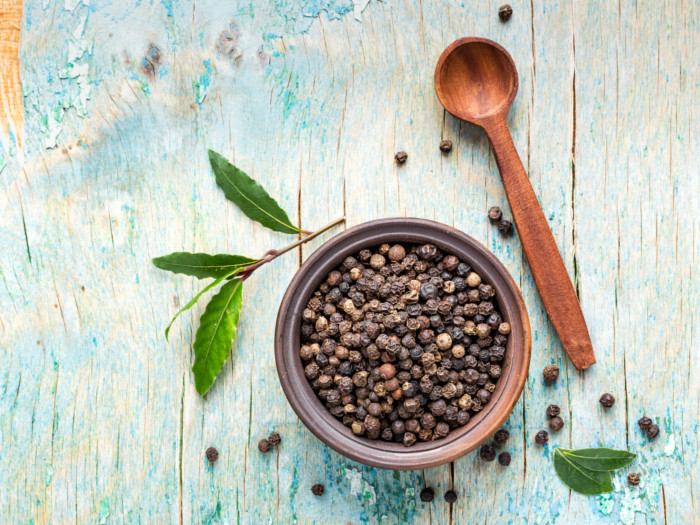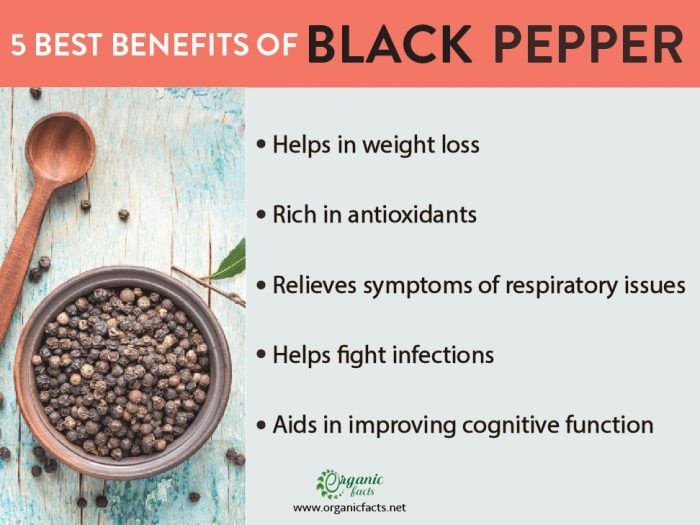A pinch of black pepper added to any recipe works as more than just a flavor enhancer. Often called the king of spices, black pepper is known to offer several health benefits while providing an excellent depth of flavor to any dish. The use of black pepper in the diet could help promote weight loss, improve digestion, relieve cold and cough, boost metabolism.
What is Black Pepper?
Black pepper is the fruit of the black pepper plant from the Piperaceae family. It is used as both spice and medicine. The presence of piperine, a bioactive, is what gives peppercorns its biting, almost pungent spiciness. [1]
Varieties such as Malabar pepper and Tellicherry pepper are native to the southern parts of India. The Malaysian and Indonesian islands are known for varieties such as Sarawak and Lampong. While India is known for pepper exports, a new study has found that the plant was brought to the subcontinent from Southeast Asia, over 30 million years ago. [2] [3]
Since ancient times, black pepper is one of the most widely-traded spices in the world. It is not a seasonal plant making it available throughout the year. When dried, this plant-derived spice is referred to as a peppercorn. Due to its possible antibacterial properties, pepper is used to preserve food. Black pepper could also be an anti-inflammatory agent.

Whole black peppercorns on a blue table Photo Credit: Shutterstock
| Serving Size : | |
|---|---|
| Nutrient | Value |
| Water [g] | 12.46 |
| Energy | 251 |
| Energy [kJ] | 1050 |
| Protein [g] | 10.39 |
| Total lipid (fat) [g] | 3.26 |
| Ash [g] | 4.49 |
| Carbohydrate, by difference [g] | 63.95 |
| Fiber, total dietary [g] | 25.3 |
| Sugars, total including NLEA [g] | 0.64 |
| Sucrose [g] | 0.02 |
| Glucose (dextrose) [g] | 0.24 |
| Fructose [g] | 0.23 |
| Galactose [g] | 0.15 |
| Calcium, Ca [mg] | 443 |
| Iron, Fe [mg] | 9.71 |
| Magnesium, Mg [mg] | 171 |
| Phosphorus, P [mg] | 158 |
| Potassium, K [mg] | 1329 |
| Sodium, Na [mg] | 20 |
| Zinc, Zn [mg] | 1.19 |
| Copper, Cu [mg] | 1.33 |
| Manganese, Mn [mg] | 12.75 |
| Selenium, Se [µg] | 4.9 |
| Fluoride, F [µg] | 34.2 |
| Thiamin [mg] | 0.11 |
| Riboflavin [mg] | 0.18 |
| Niacin [mg] | 1.14 |
| Pantothenic acid [mg] | 1.4 |
| Vitamin B-6 [mg] | 0.29 |
| Folate, total [µg] | 17 |
| Folate, food [µg] | 17 |
| Folate, DFE [µg] | 17 |
| Choline, total [mg] | 11.3 |
| Betaine [mg] | 8.9 |
| Vitamin A, RAE [µg] | 27 |
| Carotene, beta [µg] | 310 |
| Carotene, alpha [µg] | 12 |
| Cryptoxanthin, beta [µg] | 25 |
| Vitamin A, IU [IU] | 547 |
| Lycopene [µg] | 20 |
| Lutein + zeaxanthin [µg] | 454 |
| Vitamin E (alpha-tocopherol) [mg] | 1.04 |
| Tocopherol, gamma [mg] | 6.56 |
| Tocotrienol, alpha [mg] | 0.85 |
| Vitamin K (phylloquinone) [µg] | 163.7 |
| Fatty acids, total saturated [g] | 1.39 |
| 6:0 [g] | 0.01 |
| 8:0 [g] | 0.1 |
| 10:0 [g] | 0.04 |
| 12:0 [g] | 0.09 |
| 14:0 [g] | 0.03 |
| 16:0 [g] | 0.53 |
| 18:0 [g] | 0.33 |
| Fatty acids, total monounsaturated [g] | 0.74 |
| 14:1 [g] | 0.02 |
| 16:1 [g] | 0.08 |
| 18:1 [g] | 0.65 |
| 18:1 c [g] | 0.65 |
| Fatty acids, total polyunsaturated [g] | 1 |
| 18:2 [g] | 0.69 |
| 18:3 [g] | 0.15 |
| 18:3 n-3 c,c,c (ALA) [g] | 0.15 |
| 20:3 [g] | 0.15 |
| Phytosterols [mg] | 92 |
| Tryptophan [g] | 0.06 |
| Threonine [g] | 0.24 |
| Isoleucine [g] | 0.37 |
| Leucine [g] | 1.01 |
| Lysine [g] | 0.24 |
| Methionine [g] | 0.1 |
| Cystine [g] | 0.14 |
| Phenylalanine [g] | 0.45 |
| Tyrosine [g] | 0.48 |
| Valine [g] | 0.55 |
| Arginine [g] | 0.31 |
| Histidine [g] | 0.16 |
| Alanine [g] | 0.62 |
| Aspartic acid [g] | 1.41 |
| Glutamic acid [g] | 1.41 |
| Glycine [g] | 0.44 |
| Proline [g] | 1.41 |
| Serine [g] | 0.41 |
| Sources include : USDA [4] | |
Black Pepper Nutrition Facts
Black pepper may contain minerals like potassium, calcium, magnesium, phosphorus, sodium, and possibly vitamins such as thiamin, riboflavin, niacin, and vitamin B6, according to the USDA FoodData Central. Other nutrients may include vitamin E, folate, and vitamin K. [5]
Black pepper may also have dietary fiber and a moderate amount of carbohydrates and protein.
Health Benefits of Black Pepper
Black pepper may aid in weight loss and can also help in relieving sinus, asthma, and nasal congestion. Let us discuss the health benefits of black pepper in detail. [6]
May Improve Digestion
Consuming pepper might increases the hydrochloric acid secretion in the stomach and thereby could facilitate digestion. Proper digestion is essential to avoid intestinal issues including diarrhea, constipation, and colic. Black pepper might also be a carminative and laxative. [7] [8]
Could Help In Weight Loss
The outer layer of peppercorn could assist in the breakdown of fat cells. Therefore, peppery foods are a good way to help you shed weight naturally. When fat cells are broken down into their parts, they are easily processed by the body and applied to other processes and enzymatic reactions, rather than settling in your body and making you overweight. Ayurvedic tea made with black pepper is one of the teas recommended for weight loss. [9]
May Provide Respiratory Relief
In Ayurvedic practices, adding pepper to tonics could help treat cold and cough. It may also provide relief from sinusitis and nasal congestion. It may have expectorant properties that could help break up the mucus and phlegm depositions in the respiratory tract. [10]
Soups and stews made with black pepper and other aromatic spices could be used to treat colds and coughs. The use has been found in Ayurvedic and Unani practices of medicine in India. [11]

Since ancient times, black pepper is one of the most widely-traded spices in the world.
Antibacterial Quality
The possible antibacterial property of pepper may help fight against infections and insect bites. Pepper added to the diet could help keep your arteries clean by acting in a similar way to fiber such as scraping excess cholesterol from the walls, thereby possibly helping reduce atherosclerosis. [12]
Research published in the journal Phytomedicine showed that the compounds present in pepper could be active against Bacillus subtilis, Bacillus sphaericus, Staphylococcus aureus among gram-positive bacteria, and against certain gram-negative bacterial strains. [13]
May Enhance Nutrient Bioavailability
Research suggests that black pepper may help in transporting the benefits of other herbs and compounds to different parts of the body, thus could maximize the efficiency of the other foods we consume. That is why adding it to food not only makes it delicious but could also help in making the nutrients more available and accessible to our system. [14]
May Provide Relief From Peptic Ulcers
Some studies have shown that pepper may have beneficial effects on gastric mucosal damage and peptic ulcers due to its possible antioxidant and anti-inflammatory properties. [15]
Tips to use Black Pepper
- Preparing grounded pepper powder at home is better than buying it ready-made. However, even homemade powder retains its freshness for only 3 months, while whole peppercorns can keep their freshness indefinitely.
- Adding a pinch of black pepper to every meal may help in improving both, taste and digestion. It could also help improve your overall health and well-being.
- You can add pepper to your eggs, when marinating meat, or sprinkle a small pinch on your salads such as watermelon and feta.
Black Pepper FAQs
Is black pepper good for you?
Yes, it is good for most. According to Ayurvedic medicine, black peppercorns may help prevent earaches and gangrene. It may also be good for treating conditions like hernias, hoarseness, insect bites, and is also commonly used to treat dental issues (tooth decay and toothaches). In ancient times, pepper was also administered to treat vision problems. [16]
How to select and store peppercorns?
Available in stores all year round, it’s better to buy whole pepper seeds, not powdered pepper. Look for peppercorns that are compact, round, heavy, and wholesome. Peppercorns can be stored for months in a dry air-tight container at room temperature, in a dry and dark place. And you can keep the ground black pepper in the refrigerator for longer shelf life, but it is best to crush them into a powder fresh when required.
How is pepper made?
Black peppercorns first bud as fruits that originally look green. They are allowed to grow in bunches like a grapevine and are cooked. After this, the peppercorns are sun-dried. The peppercorns turn dark brown or black during the drying process and they also shrink in size. These are then sold in the market. You can grind the peppercorns to make them into pepper powder for seasoning.
Word of Caution: Pepper may cause sneezing and trigger asthma symptoms in some people. If you haven’t tried pepper before, test a tiny amount at first, or consult your healthcare provider. Patients who have undergone abdominal surgery should not add excessive pepper to their diet because it can have an irritating effect on the intestines. It should not be taken in high concentration, and if you see signs of an allergic reaction, discontinue its use and consult a doctor. [17]
